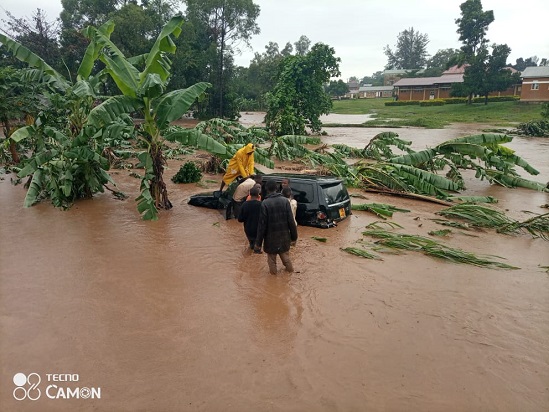Mbale floods have left scores dead/Courtesy photo
Bagishu and Sabiny have a choice between a rock and hard ground: a calamity and a dilemma. Landslides, which are an act of God on one hand, evictions by Uganda Wildlife Authority on the other are what they have to choose from. As s hospitality professional my views are as follows:-
The fulfillment of human needs causes environmental change of some sort. Every time people act, it usually means that something is gained and something is lost. The arguments are about whether such actions are detrimental or not; whether the environment is harmed and or the environment is sustained. Environmental issues are largely a question of trade-offs; for example when development takes place resources are used, access is improved but views are obstructed or trees are cut down. New factories are created but the air polluted.
There are many pressing global environmental issues such as global warming (green house effects), the ozone layer and the use of chlorofluoro carbon, pesticide use, desertification and the problems of urbanization, air-water and noise pollution, waste disposal, habitat destruction, soil depletion, endangered species, acid rains and so on and so forth.
Every time the masses (people) cultivate crops, construct buildings and other structures, divert rivers, and engineer new roads, bridges or undertake any development, it rebounds in some way on the environment. However, if the use of natural resources is denied to the people, again, because of conservation, it is likely to mean some loss of income-earning opportunities.
Most natural areas are located in rural areas. The developments of tourism or tourist activities in such areas have considerable impact on the local communities. Sensitive use of policies that cause minimum, negative social impacts, but allow high levels of local involvements must be emphasized. Jobs for local communities such as tour guides and porters must be high on the priority agenda in order to obtain community support. If conservation causes a loss of income, the local population must be somehow compensated. This is where Uganda Wildlife Authority in the case of Elgon region has failed the people around Mt. Elgon national park. First, there is no sensitization; instead people are frequently threatened with forceful evictions pushing people to compete with the animals for the land and poachers killing wildlife.
Two examples below:
- In the Himalayan kingdom of Bhutan, in the Phobjika valley a well-known wintering area for the rare black-necked cranes almost such as ours here in Uganda is also home to a community to a local community which initially cultivated a high-yielding potato as a cash crop to develop their region. Because the rare cranes are valued more highly than potatoes, the Phobjika valley community had to be compensated by government.
- Also in one area of Zanzibar, part of Tanzania there was one small hotel. The community around and closest village some 2 kilometers away from the hotel, started selling sea shells, a very important resource that attracts foreign tourists. To protect the natural environment, the hotel management discouraged their guests from buying the shells, therefore depriving the villagers a source of income. In compensation, all the hotel staff were exclusively recruited from that particular village. The hotel also committed to buy as many supplies as possible from that community. Also the hotel to date continues to counsel the villagers on how to grow various vegetables and fruits which it needs for its menus. The government of Uganda therefore, must compensate the suffering Mt. Elgon communities and sensitize them on how to explore other income generating avenues through the opportunities offered by tourism to avoid the frequent calamities viz; landslides, floods and storms as they are happening today.
By Nabendeh Wamoto S.P. (+256 776 658433)
Email: simonwamoto@yahoo.co.uk





